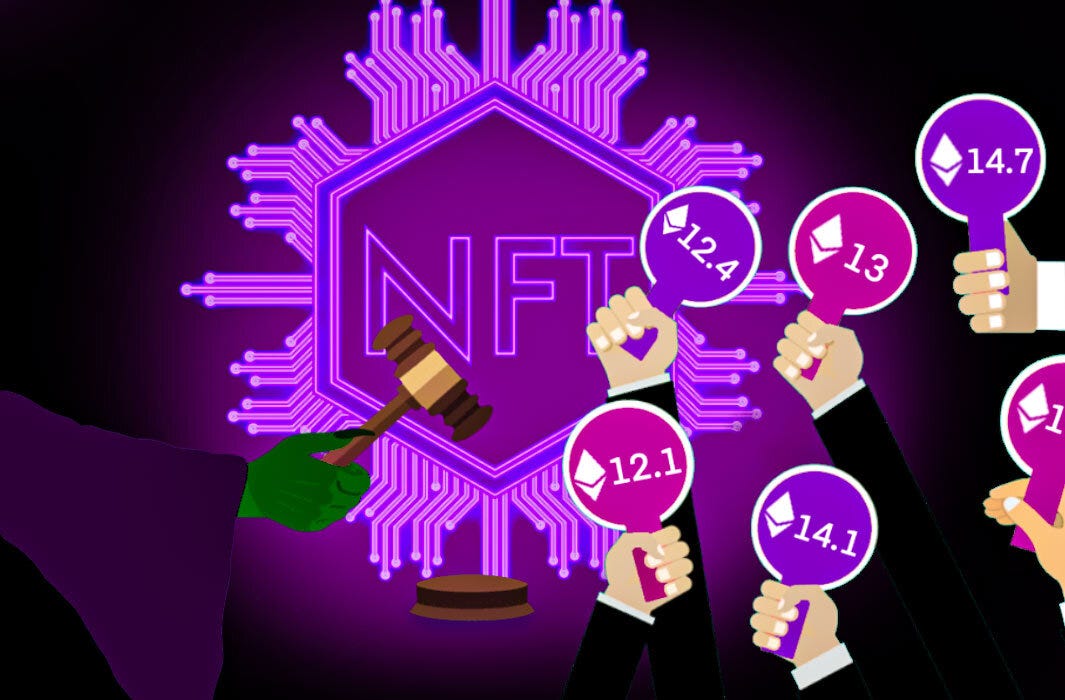Auctions have emerged as one of the most competitive and thrilling methods of acquiring high-value digital assets** as the NFT market continues to develop. From rare collectibles and game items to art and music, NFT auctions provide a dynamic, real-time marketplace where pricing is determined by psychology, urgency, and demand.
However, costly errors frequently accompany high stakes. Understanding the mechanics of NFT auctions and the art of strategic bidding can be the deciding factor between a wise investment and a regrettable overbid, regardless of whether you are a novice bidder or an experienced collector.
Before entering the realm of NFT auctions, it is imperative that you possess the following knowledge.
🔍 **NFT Auction Types**
In the NFT sector, there are numerous auction formats. It is essential to identify the individual with whom you are interacting in order to formulate an effective bidding strategy.
1. **English Auction (Highest Bid Wins)**
* The most prevalent type. * Bidders submit offers that increase in value. * *The auction concludes either at the specified time or when no additional bids are submitted. Utilized by platforms such as **SuperRare**, **Zora**, and **Foundation**.
2. **Dutch Auction (Price Declines Over Time)**
* Commences at a high price and decreases until a purchase is made. Frequently implemented in NFT project mints to mitigate gas warfare. The final price for all other buyers is determined by the first buyer, subject to the rules.
3. **Sealed-Bid Auction**
* Bidders submit their highest offer in confidence. The highest vendor typically prevails, paying either their full bid or a modest premium over the second-highest bid. Used for exclusive deliveries or one-of-a-kind artworks.
4. **Reserve Auctions**
* The vendor establishes a minimum price (reserve). The auction will commence upon the fulfillment of the reserve. Bidding typically commences and continues for 24–48 hours.
🛡️ **Getting Ready for an Auction**
In order to safeguard yourself and optimize your chances, implement the subsequent measures prior to commencing the tendering process:
* **Confirm authenticity**: Ensure that the NFT is listed by the legitimate creator or project. Search for badges that have been verified or cross-reference social media.
* **Comprehend the expenses**: Be cognizant of platform fees, gas fees (on Ethereum), and potential royalty fees on resale.
* **Establish a budget**: Prior to commencing the tendering process, ascertain your maximum allowable expenditure. Overpaying is the result of emotional bargaining.
* **Ensure that your pocketbook is adequately funded**: Before placing your bids, verify that your wallet contains an adequate amount of ETH, SOL, or other pertinent cryptocurrency.
🎯 **Effective Bidding Strategies**
The following are five intelligent purchasing strategies that can provide you with a competitive advantage in NFT auctions:
1. **The Sniper Bid (Last-Minute Play)**
* Delay placing a large proposal until the final seconds. Decreases the likelihood of a bidding conflict. It is most suitable for auctions with predetermined conclusion times; however, be cautious of automatic time extensions.
2. **The Anchor Bid (Early Aggression)**
* Submit a daring bid at the outset to deter competitors. It is most effective when you are certain that others will not exceed your expectations.
* Risk: In the event that no other bidders were anticipated, you may be required to pay a premium.
3. **The Shadow Strategy (Watch and React)**
* Monitor the early tendering activity without participating. * If the prices remain within your budget or the competition appears to be feeble, intervene. * Maintains flexibility and prevents superfluous petroleum expenses.
4. **The Bidding Ladder (Incremental Bids)**
* Gradually increase your bids to evaluate the competition. * Assists in determining the minimum winning price without going overboard. * Necessitates fast decision-making and meticulous scheduling.
5. **Optimize Gas Usage for Ethereum Users**
* Increasing your **gas fee** during high-traffic auctions can expedite the process of your transaction.
* Monitor real-time petroleum prices by employing instruments such as **GasNow** or **Blocknative**.
⚠️ **Common Auction Pitfalls to Avoid**
* **Overbidding as a result of hype**: Adhere to your budget. The mere fact that something is popular today does not guarantee that it will retain its value in the future.
* **Ignoring utility or provenance**: Ensure that the NFT has enduring value, regardless of whether it is artistic, cultural, or functional.
* **Beware of fraudulent collections**: Prior to placing a bid, verify the contract address and the creator’s history.
✅ **Subsequent to the Auction: What Happens?**
In the event that you are victor
* The NFT will be transferred to your wallet automatically upon confirmation of payment. Metadata that validates authenticity and ownership on the blockchain are frequently transmitted to you.
In the event that you are unsuccessful:
* You typically do not incur any fees, and your cryptocurrency remains in your wallet (although certain platforms impose a nominal gas fee for unsuccessful bids).
Final Thoughts: Bid with Intelligence, Not Haste
Although NFT auctions can be exhilarating, they are also intricate marketplaces that necessitate meticulous attention, research, and timing. **In the pursuit of a rare 1-of-1 digital painting or a limited-edition mint,** **knowledge is your most valuable asset**.
By adhering to your strategy, observing the market, and learning the rules, you will be significantly more likely to acquire an asset that is both valuable and meaningful.
**What is your preferred bidding approach? Have you ever participated in a significant NFT auction, either as a winner or a loser? Please share your narrative in the comments section. **

Leave a Reply